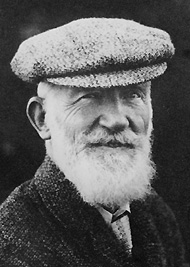![]()
Departments
![]()

|
Week of 24 September 1999 |
Vol. III, No. 7 |
Feature Article
|
|
|
This photograph of Shaw is part
of Boston University's Special Collections
holdings.
|
By Hope Green
In 1922, George Bernard Shaw drafted an acerbic review of an article by another literary luminary, the idealistic H.G. Wells. In the article, Wells (author of The War of the Worlds, The Time Machine, and The Invisible Man) had compiled a list of prominent historical figures he deemed were the six greatest men of all time.
Shaw denounced the project as "idiotic."
"Asking for the names of the six greatest men is like asking for the names of the six greatest tools in the carpenter's bag," he wrote, and went on to accuse Wells of using mere popularity as a barometer of excellence. "Great men are statues of our ideals," he wrote. "Our hopes and enthusiasms crystallize upon some name: that is all . . . I am a Great Man myself; and I know."
A draft of Shaw's critical piece in its original pen scratchings is on view in the Theodore Roosevelt Room on the ground floor of Mugar Library. The scrap of paper is part of a small but well-documented set of Shavian artifacts that Special Collections Director Howard Gotlieb has accumulated during the last 25 years from an assortment of dealers and donors.
Shaw, the playwright, music critic, novelist, and journalist whose social satire Mrs. Warren's Profession is currently being staged at the Boston University Theatre, corresponded with people all over the world. A sampling of his jottings is part of a rotating exhibit at Mugar and shares a display case with letters left behind by the eccentric literary trio of Edith Sitwell and her siblings, Osbert and Sacheverell.
But the bulk of the Shaw holdings at BU resides in the fifth-floor storage rooms of Special Collections. There the University keeps approximately 200 of his handwritten letters dating from 1885 until 1950, the year he died at the age of 94, as well as a stack of his business papers, genealogy records, and photographs.
Tucked carefully away in the files is a letter dated July 25, 1903, in which Shaw authorizes the performance of Mrs. Warren's Profession in the United States and Canada. Other letters concern such major causes such as the Fabian Society, the socialist movement to which he and Wells belonged.
Shaw's review of the Wells article was not the first time he openly criticized his colleague. Although Shaw sponsored Wells's entry into the Fabian Society, he later was disturbed by the younger man's ideas for overhauling the group. Disputes in which they challenged one another's morality and integrity also strained the friendship.
On stage at the Huntington
An iconoclast and social critic, Shaw was an
outspoken feminist early in the struggle. Mrs. Warren's
Profession -- written in 1893 and banned from all public
stages in England until 1924 -- dramatizes Shaw's feminist
leanings, justifying working-class women who saw
prostitution as a lesser evil than the socially accepted,
exploitive jobs available to them. Shaw published the work
in a two-volume set entitled Plays Pleasant and Unpleasant
(1898), and BU owns a set that Shaw inscribed to a friend on
one of the frontispieces.
"Shaw seemed unable to write a boring five-word sentence," notes Charles Niles, senior archival assistant at Special Collections. "Even his postcards are full of bon mots."
"Case Studies" is an occasional feature highlighting items of interest from the University's collections and archives.
